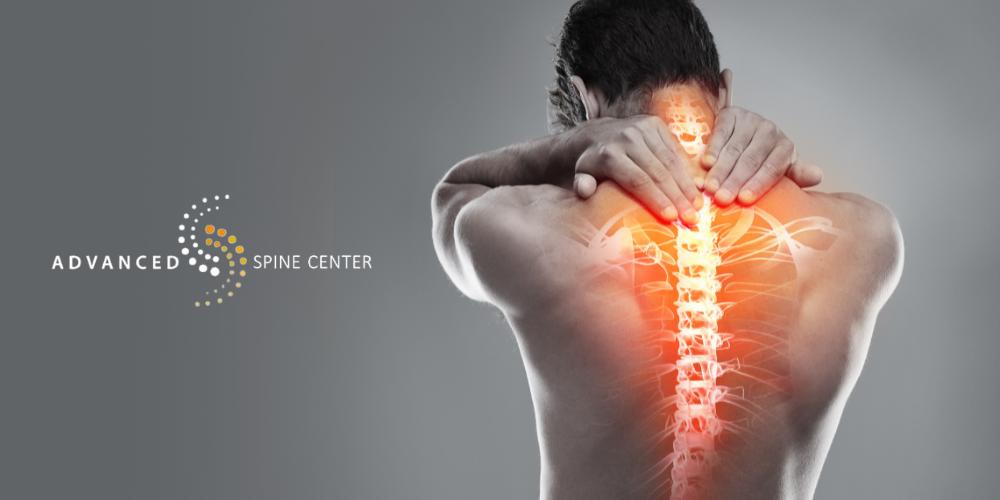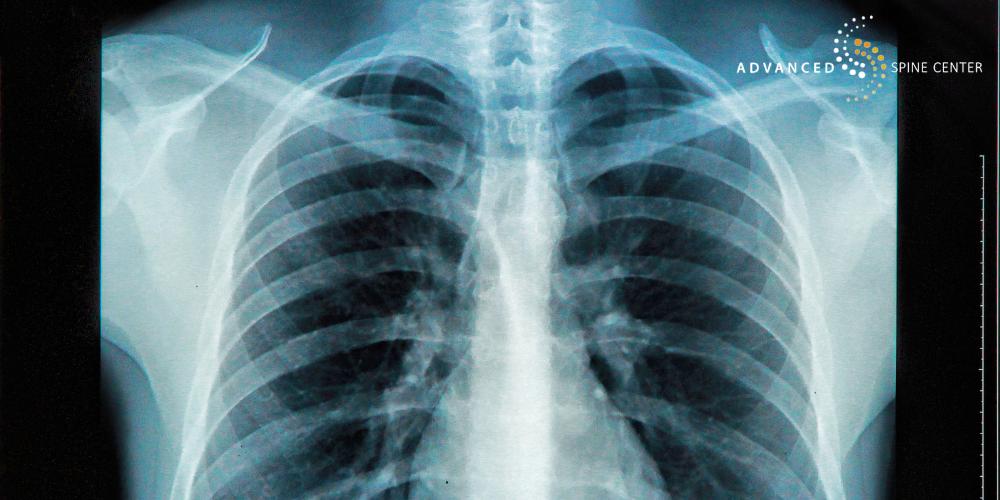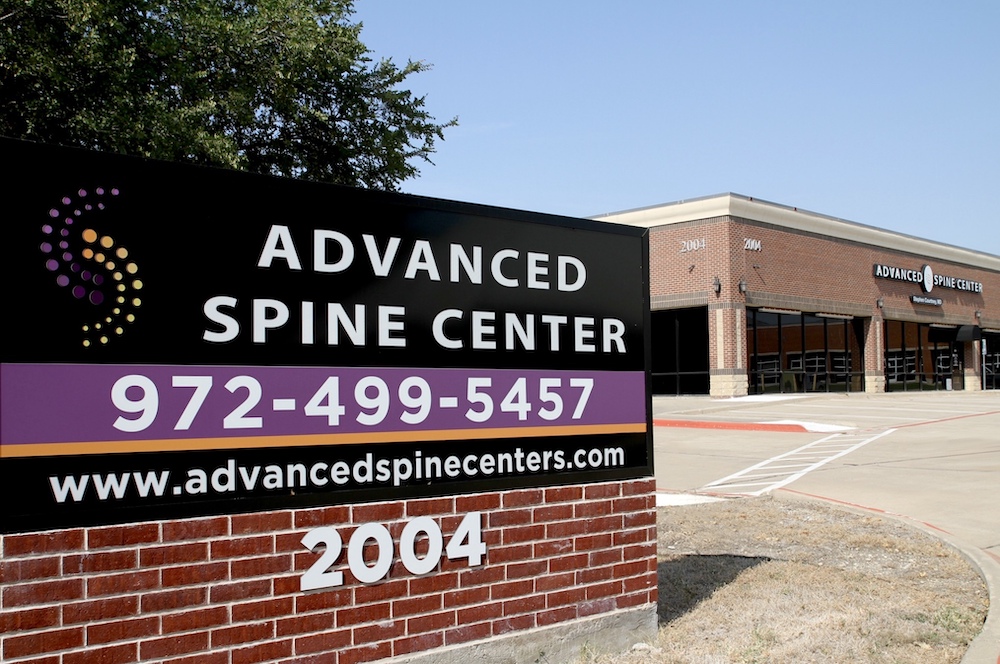Cervical Revision Surgery McKinney, TX
Home > Orthopedic Spine Surgeon McKinney, TX > Cervical Revision Surgery McKinney, TX
Specialties

At the Advanced Spine Center, we specialize in providing exceptional care for various spine-related conditions. Cervical revision surgery is a critical aspect of our comprehensive spine surgery services. If you have undergone an unsuccessful cervical surgery, you’ve come to the right place. Whether that failed surgery was a spinal fusion, anterior cervical discectomy, or another procedure, Dr. Courtney will provide only the best care possible for your revision.
To schedule an appointment with us, please call our office at 972-499-5457 today. You can also schedule an appointment online by clicking the button below.
What Is Cervical Revision Surgery?
Cervical spine revision surgery refers to the procedure performed to correct or improve the results of an initial surgery on the cervical spine. The initial surgery may have been performed to treat degenerative disc disease or another condition. Revision surgery is designed to address issues such as failed neck surgery syndrome, recurrent symptoms, complications from prior surgery, or the need for further spinal stabilization or decompression.
Our team of experienced spine surgeons at the Advanced Spine Center is highly skilled in performing cervical revision surgery to help patients regain their quality of life.
How Common Is Cervical Revision?
Cervical revision spinal surgery is fairly uncommon. Not many patients who have undergone cervical spine surgery experience the need for a revision procedure. However, as with any surgery, there is always a risk of complications, even if the risk is very small. Complications can arise due to various factors, including underlying conditions, complications from the initial surgery, or the natural progression of spinal issues.
When Do We Recommend Cervical Revision Surgery?

Our expert spine surgeons consider cervical revision surgery when patients experience ongoing or recurrent symptoms after a previous cervical spine surgery. Some common indications for cervical revision surgery include the following.
- Failed Neck Surgery Syndrome: This condition occurs when a patient continues to experience neck pain, numbness, weakness, or other symptoms after a cervical spine surgery.
- Persistent or Recurrent Symptoms: When patients’ initial symptoms return or persist after a previous surgery.
- Complications from Prior Surgery: In cases where complications, such as infection, poor cervical spine alignment, or hardware failure, arise from the initial procedure.
- The Need for Further Stabilization or Decompression: In situations where additional stabilization or decompression is required to address the underlying spine condition, such as spinal deformity or cervical myelopathy.
Dr. Courtney will evaluate your specific condition and recommend cervical revision surgery when it is the best course of action to improve your spinal health and overall well-being.
What Is Failed Neck Surgery Syndrome?
Failed Neck Surgery Syndrome, often referred to as FNSS, is a term used to describe a condition in which a patient experiences persistent or recurrent symptoms following a cervical spine surgery. These symptoms may include neck pain, arm pain, numbness, weakness, and limited mobility. It is crucial to address FNSS through cervical revision surgery to provide relief and improve the patient’s quality of life.
Why Might a Cervical Spinal Surgery Fail?
Several factors can contribute to the failure of cervical spine surgery, leading to the need for revision surgery. These factors may include the following.
- Incomplete Decompression: If the initial surgery did not adequately relieve pressure on the spinal cord or nerve roots, it could result in persistent symptoms, such as adjacent segment disease.
- Hardware Complications: Issues with hardware used in the initial surgery, such as loosening or breakage, can lead to the need for revision.
- Infection: In some cases, post-surgical infections can develop, causing complications that require further surgical intervention.
- Scar Tissue Formation: Excessive scar tissue can impede the healing process and lead to persistent symptoms.
- Inadequate Fusion: If a solid fusion between spinal vertebrae does not form as expected, it can result in instability and discomfort.
Understanding the cause of your failed cervical spine surgery is essential for determining the appropriate course of action. This is why we recommend scheduling a consultation with Dr. Courtney to discuss your options.
Symptoms of a Failed Cervical Spine Fusion
Patients who have undergone cervical spine surgery and experienced a failed fusion may exhibit the following symptoms.
- Persistent or worsening neck pain and arm pain: Ongoing pain in the neck or radiating down the arms.
- Numbness or tingling: Sensation changes in the arms or hands.
- Weakness: Reduced strength or muscle control in the arms.
- Limited mobility: Difficulty moving the neck or experiencing stiffness.
If you’re experiencing any of these symptoms following a previous cervical spine surgery, it’s essential to consult with our McKinney spine specialists at the Advanced Spine Center.
How Do We Correct a Failed Cervical Fusion With Revision Surgery?

Cervical revision surgery is a complex procedure that aims to correct the issues resulting from a failed cervical spinal surgery, such as a multilevel anterior cervical discectomy or cervical fusion. The surgery typically involves two primary components: stabilization and decompression.
Dr. Courtney at the Advanced Spine Center will carefully evaluate your condition and recommend the most appropriate approach to address the specific issues causing your failed cervical fusion.
Stabilization
The first aspect of cervical spinal fusion revision surgery is the stabilization of the spine. This may include the removal or replacement of existing hardware, such as screws, plates, or cages if they have loosened or caused complications. The surgeon will then reposition and secure the hardware to provide the necessary stability to the affected vertebrae.
Decompression
The second aspect of the surgery involves decompression, which may be necessary if the initial surgery (such as a posterior cervical decompression) fails to relieve pressure on the spinal cord or nerve root adequately. The surgeon may need to remove bone spurs, herniated discs, or any other structures compressing the spinal cord or nerves. This decompression step is vital for relieving pain and restoring proper spinal function.
How to Prepare for Cervical Revision Surgery
Preparing for cervical revision surgery is a critical part of the process. Our surgeons will explain some essential steps to take before the procedure to ensure positive clinical outcomes.
- Consultation: Schedule a consultation with our spine specialists to discuss your symptoms, medical history, and the need for revision surgery. This is an opportunity to ask any questions and address concerns.
- Medical Evaluation: Undergo a thorough medical evaluation, which may include blood tests, imaging, and other diagnostic assessments.
- Medications: Discuss your current medications with your healthcare team, as some medications may need to be adjusted or temporarily discontinued before surgery.
- Lifestyle Adjustments: Make any necessary lifestyle adjustments, such as quitting smoking, as smoking can hinder the healing process.
- Diet and Nutrition: Follow a balanced diet and stay hydrated to optimize your body’s ability to heal.
- Recovery Planning: Arrange for a support system during your recovery, as you may need assistance with daily tasks in the immediate postoperative period.
Our team will guide you through each step of the preparation process to ensure a smooth and successful cervical revision surgery.
What Is the Process of Cervical Revision?
Cervical revision surgery is a complex procedure that requires careful planning and execution. Here’s an overview of the typical process.
Consultation and Evaluation
The process begins with a thorough consultation and evaluation by our spine specialists. During this stage, we will review your medical history, assess your current condition, and discuss your symptoms and treatment goals. Diagnostic tests, such as X-rays, CT scans, or MRIs, may be conducted to provide a comprehensive understanding of your cervical spine.
Preoperative Planning
After the initial evaluation, our surgical team will develop a personalized surgical plan tailored to your specific needs. This plan will outline the surgical approach, the need for hardware removal or replacement, and the extent of decompression required.
Surgery
The actual surgery typically involves the following steps:
- Anesthesia: You will be placed under general anesthesia to ensure you are comfortable and pain-free during the procedure.
- Incision: The surgeon will make an incision at the surgical site, typically in the front of the neck, to access the cervical spine.
- Hardware Management: If necessary, any existing hardware will be removed, replaced, or repositioned to stabilize the spine.
- Decompression: The surgeon will carefully remove bone spurs, herniated disc material, or any other structures causing compression of the spinal cord or nerve roots.
- Fusion: After decompression, the surgeon may perform a fusion to stabilize the affected vertebrae. This may involve using bone grafts, plates, screws, or cages to promote fusion.
Closure
Following the surgical procedure, the incision will be closed with sutures or staples, and a sterile dressing will be applied to the wound.
Recovery
After the surgery, you will be closely monitored in the recovery area as the anesthesia wears off. You may spend some time in the hospital for observation and pain management, depending on your specific case.
Our dedicated team at the Advanced Spine Center will be with you every step of the way, ensuring that you receive the highest level of care and support throughout your cervical revision surgery.
What Should You Expect After Cervical Revision Surgery?

Understanding what to expect after cervical revision surgery is essential for a smooth recovery process. Here are some key points to keep in mind.
- Pain Management: It is normal to experience some pain and discomfort after surgery. Our medical team will provide pain management strategies to keep you as comfortable as possible.
- Hospital Stay: Depending on the complexity of your surgery and your overall health, you may need to stay in the hospital for a few days for observation.
- Physical Therapy: Physical therapy and rehabilitation are typically an integral part of the recovery process. These sessions help you regain strength, mobility, and function.
- Gradual Return to Activities: You will need to increase your activity levels gradually as your body heals. Your surgeon and physical therapist will provide guidance on when it’s safe to resume various activities.
- Follow-Up Appointments: Regular follow-up appointments with your surgeon are crucial for monitoring your progress and making any necessary adjustments to your recovery plan.
- Full Recovery: It may take several weeks to months to achieve a full recovery, depending on the complexity of the surgery and individual factors.
Our team will provide you with a detailed post-operative plan and support to ensure the best possible outcome from your cervical revision surgery.
Expected Recovery Time for Cervical Revision
The recovery time for cervical revision spine surgery can vary from patient to patient and depends on the complexity of the procedure, overall health, and adherence to the post-operative plan. In general, here’s what you can expect:
Immediate Postoperative Period: You will spend several days in the hospital, where you’ll be monitored for any potential complications. During this time, you’ll receive pain management and support from our medical team.
Return to Light Activities: After being discharged, you can typically start light activities within a few weeks, such as walking and gentle stretching exercises.
Physical Therapy: Most patients will undergo physical therapy, which can last for several weeks. The therapist will work with you to rebuild strength and mobility.
Full Recovery: A full recovery can take several months. It’s important to follow your surgeon’s recommendations and take it slow to ensure the best outcome.
Return to Normal Activities: Gradually, you can return to your normal daily activities, including work and recreational pursuits, once your surgeon gives you the green light.
Our team will work closely with you to create a personalized recovery plan that considers your specific condition and goals.
How Successful Is Cervical Spinal Revision Surgery?
The success of cervical spinal revision surgery depends on various factors, including the patient’s overall health, the complexity of the procedure, and the underlying spine condition. In many cases, cervical revision spine surgery can provide substantial relief from pain and symptoms, allowing patients to regain their quality of life. However, like any surgical procedure, there are no guarantees, and individual results may vary.
Our experienced spine surgeons at the Advanced Spine Center have a track record of successful cervical revision surgeries and are dedicated to optimizing your chances of a positive outcome. We will work with you to establish realistic expectations and provide the highest quality of care.
Who Is a Good Candidate for Cervical Revision?

Determining if you are a suitable candidate for cervical revision surgery is a critical decision made in consultation with our spine specialists. Potential candidates for cervical revision surgery typically exhibit the following criteria.
- Persistent Symptoms: You are experiencing persistent or recurrent symptoms, such as neck pain, arm pain, weakness, or numbness, after a previous cervical spine surgery.
- Failed Neck Surgery Syndrome: A confirmed diagnosis of Failed Neck Surgery Syndrome.
- Underlying Spine Condition: A spine condition that requires revision surgery, such as complications from the initial surgery or the need for additional stabilization or decompression.
- Medical Evaluation: A comprehensive medical evaluation confirms that you are healthy enough to undergo surgery and that the potential benefits outweigh the risks.
Our experienced team at the Advanced Spine Center will carefully assess your case and provide personalized recommendations to ensure the best possible outcome from cervical revision surgery.
What Are the Possible Risks and Complications of Cervical Spine Surgery Revision?
As with any surgical procedure, cervical spine surgery revision carries certain risks and potential complications. It’s essential to be aware of these possibilities, although they are relatively uncommon. Some of the potential risks and complications include:
- Infection: Surgical site infections can occur, but they are generally treatable with antibiotics.
- Bleeding: Excessive bleeding during surgery is rare but can be addressed by the surgical team.
- Nerve or Spinal Cord Injury: While every effort is made to avoid this, injury to nearby nerves or the spinal cord is a potential risk, which could lead to new or worsened symptoms.
- Hardware Issues: Hardware-related complications, such as loosening or breakage, may require further surgery.
- Fusion Issues: In some cases, the bone graft fusion may not fully stabilize, requiring additional surgery or a longer recovery period.
- General Surgical Risks: Risks associated with anesthesia and surgical procedures in general, such as blood clots and adverse reactions to medications.
Our experienced spine surgeons take every precaution to minimize these risks and complications and closely monitor patients throughout the entire process. We prioritize your safety and well-being, and our team will be available to address any concerns or complications promptly.
Contact the Advanced Spine Center for Cervical Revision in McKinney, TX
If you are experiencing persistent or recurrent symptoms following a cervical spine surgery or suspect the need for cervical revision surgery, the Advanced Spine Center is here to provide the highest level of care. Our expert team of spine specialists is dedicated to evaluating your condition, providing personalized treatment plans, and guiding you through a successful recovery.
Don’t let unresolved symptoms or a failed cervical spine surgery hinder your quality of life. Contact us today to schedule a consultation and take the first step toward regaining your quality of life. At the Advanced Spine Center, your comfort, health, and satisfaction are our top priorities. To schedule an appointment with us, please call our office at 972-499-5457 today.

Request an Appointment
Common Patient Questions
ExcellentBased on 147 reviews
 Robert AliceaThe doctor and his staff were very welcoming and kind ..explained my issues in detail . Will highly recommend
Robert AliceaThe doctor and his staff were very welcoming and kind ..explained my issues in detail . Will highly recommend German CisnerosEvery visit to Dr. Courtney's office is educational and most beneficial. Dr. Courtney and ALL of his staff are the best!
German CisnerosEvery visit to Dr. Courtney's office is educational and most beneficial. Dr. Courtney and ALL of his staff are the best! Jamey DerryberryMy wife and I both go to Dr Courtney for back issues. Great care. Great staff. Great surgical facility and smooth process. LOVE THEM!!!
Jamey DerryberryMy wife and I both go to Dr Courtney for back issues. Great care. Great staff. Great surgical facility and smooth process. LOVE THEM!!! Mark CotterDr Courtney and his staff truly care about my well being. They are the only ones I have found that have been able to help me with my workman's comp claim
Mark CotterDr Courtney and his staff truly care about my well being. They are the only ones I have found that have been able to help me with my workman's comp claim J “JAFO”Does your back hurt? Has your back been hurting, yet no other surgeon can or won't help you; or worse tells you nothing is wrong? You're in the wrong place! I had 4 back operations with no improvement. I had an additional 6 other consultations with "there's nothing wrong with you". The truth was I was probably 2-3 months away from permanent leg and lower back paralysis. He fixed me. I can stand, I can walk. I threw away my crutches of 13 years. If you need back correction - GO SEE THIS DOCTOR! He will fix you, and fix you correctly, if it is humanly possible. Enough said! Go see him. He tells the truth and tells it like it is. 🙂
J “JAFO”Does your back hurt? Has your back been hurting, yet no other surgeon can or won't help you; or worse tells you nothing is wrong? You're in the wrong place! I had 4 back operations with no improvement. I had an additional 6 other consultations with "there's nothing wrong with you". The truth was I was probably 2-3 months away from permanent leg and lower back paralysis. He fixed me. I can stand, I can walk. I threw away my crutches of 13 years. If you need back correction - GO SEE THIS DOCTOR! He will fix you, and fix you correctly, if it is humanly possible. Enough said! Go see him. He tells the truth and tells it like it is. 🙂 Terri StewmanDr courtney and his staff are great! Dr courtney always takes his time with you and I feel he truly cares about his patients.
Terri StewmanDr courtney and his staff are great! Dr courtney always takes his time with you and I feel he truly cares about his patients. Ross WigingtonGreat Dr and helped me multiple times over the years Would recommend to anyone that needs help
Ross WigingtonGreat Dr and helped me multiple times over the years Would recommend to anyone that needs help Bridgette e MentesanaDr. Courtney is knowledgeable and takes the time to really explain what’s going on and explain why you’re in pain and the several options to correct the issue. I never felt rushed and he was on time to our appointment which is such a rare thing. The rest of the office staff was absolutely top notch. They were really down to earth and so nice, you could tell they liked their jobs and were treated well. It was a very welcoming atmosphere. I felt very comfortable and I knew I was in capable hands just by the way he treated his staff and listened to his patients. Highly recommend.
Bridgette e MentesanaDr. Courtney is knowledgeable and takes the time to really explain what’s going on and explain why you’re in pain and the several options to correct the issue. I never felt rushed and he was on time to our appointment which is such a rare thing. The rest of the office staff was absolutely top notch. They were really down to earth and so nice, you could tell they liked their jobs and were treated well. It was a very welcoming atmosphere. I felt very comfortable and I knew I was in capable hands just by the way he treated his staff and listened to his patients. Highly recommend. Marie BentonDr Courtney did my neck surgery and my 360 back surgery. I would not go to another surgeon, he cares about his patients and it shows! His staff is great as well! I trust his opinion and skills 100%
Marie BentonDr Courtney did my neck surgery and my 360 back surgery. I would not go to another surgeon, he cares about his patients and it shows! His staff is great as well! I trust his opinion and skills 100%

